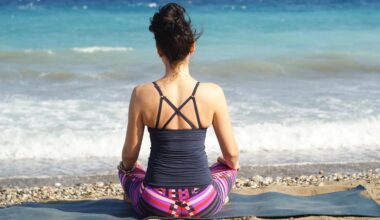Gentle Yoga Routines to Support Postnatal Recovery
Postnatal yoga practices serve as a soothing avenue for new mothers to reconnect with their bodies and promote healing after childbirth. Engaging in gentle yoga routines can lead to significant improvements in physical and mental well-being. The transformation of a woman’s body during pregnancy calls for an equally thoughtful postnatal fitness approach. Yoga targets the areas that typically may feel stiff or sore following delivery, enhancing flexibility and strength. Furthermore, incorporating mindful breathing with gentle movements fosters a calming environment. It aids in overcoming the fatigue and stress that can accompany motherhood. It is essential that routines are tailored to accommodate the individual recovery timeline, ensuring no strain on healing tissues or muscles. For those who have undergone a cesarean section, modifications in poses are vital. Listening to one’s body and respecting its limits is critical during this phase. Establishing a consistent practice, even if brief, adds layers of support for emotional stability. Many online platforms offer guided sessions suited for postnatal women, making it easier for mothers to practice yoga from the comfort of their homes.
These routines can be beneficial not only physically, but emotionally. Connecting with other mothers through yoga sessions fosters a sense of community and support. Sharing experiences with peers can alleviate feelings of isolation that some new mothers feel. Classes often incorporate sharing circles or discussions, enhancing the bond among participants. This nurturing environment facilitates personal growth and strengthens relationships. Yoga studios may offer special classes specifically tailored for postpartum women, addressing their unique needs. Trained instructors ensure that postures are suitable and safe, guiding mothers through the session with care and attention. Practicing these skills collectively allows participants to motivate each other and celebrate their progress together. As women navigate the challenges of maternity, regular attendance in classes can instill a routine, promoting mental clarity and focus. The journey through motherhood may often feel overwhelming; thus, finding a trusted community can be invaluable. Additionally, postnatal yoga helps in developing core stability, which is paramount. Strengthening the core can avert future complications, offering support during everyday activities and parenting tasks. Women often feel a renewed sense of empowerment through these practices.
Effective Yoga Poses for Postpartum Healing
Several yoga poses specifically target postnatal recovery, promoting healing and revitalization of the body. One of the most recommended poses is the Child’s Pose, which stretches the spine gently while providing relief to the lower back. Another beneficial pose is the Cat-Cow stretch, which enhances spinal flexibility while promoting relaxation and alleviating tension. Moving into a gentle forward fold can also help release tightness in the hips and shoulders, benefiting new mothers who may feel physically constrained due to carrying their infants. The Bridge pose effectively strengthens pelvic floor muscles, crucial for postpartum healing. This pose also encourages blood circulation and relieves tension in the lower body. It helps to reconnect with the core post-birth, supporting safe and gradual rebuilding of strength. Furthermore, seated forward bends are useful for calming the mind and relieving stress, all of which are essential for overall well-being. It is recommended that each pose be held for several breaths, encouraging mindfulness and presence. Women should also ensure to avoid pushing beyond their limits, focusing instead on gentle body awareness.
In addition to physical benefits, postnatal yoga also supports mental health. Mindfulness practices incorporated during yoga can significantly reduce symptoms of anxiety or postpartum depression that some women experience. Through guided breathing and meditation, mothers develop tools to manage stress effectively. Engaging in a regular practice enhances self-awareness, shifts focus away from worries, and cultivates a sense of peace. This is especially significant during the often chaotic early weeks of motherhood. Establishing a daily or weekly yoga routine creates an essential foundation for emotional stability. Many mothers find that just a few moments spent in meditation can yield a profound effect on their mood and outlook. Furthermore, the incorporation of relaxation techniques enhances the restorative quality of yoga, aiding in better sleep—a crucial element for any new parent. Breathing exercises such as Ujjayi breath can help quiet the mind, promoting a sense of calm amidst daily challenges. Consistency, compassion, and patience are key elements in this journey. By nurturing themselves physically and emotionally through yoga, mothers can embrace motherhood with a healthier perspective. Ultimately, this enhances their well-being and quality of life.
Creating a Postnatal Yoga Space at Home
Creating a dedicated yoga space in the home is an excellent way to facilitate a regular practice. Having a specific area, even if small, helps to invoke a sense of calm and readiness for wellness activities. Choose a quiet corner that can be set up with a yoga mat, cushions, and perhaps some calming décor. Soft lighting and a few plants can turn it into a rejuvenating environment conducive to relaxation. Additionally, consider the temperature and comfort levels of the room, ensuring an inviting atmosphere. Make sure to gather any necessary props, such as straps and blocks to assist with different poses. These tools can enhance comfort during practice and aid in achieving correct alignments. Furthermore, integrating calming music or soothing sounds can elevate the experience, allowing mothers to feel centered. Establishing a routine can be beneficial, even if it means a few minutes of practice daily. Consistency reinforces the positive habits of self-care. Additionally, inviting friends or family for shared sessions can create motivation and joy in practicing together, strengthening both relationships and personal growth.
Although creating a home practice space is essential, attending classes can also enrich experiences. Interactions with instructors and fellow participants offer feedback and inspiration that can enhance personal practices. This supportive environment creates lasting connections with others on similar journeys. Attending classes can also instill accountability and motivation to maintain an active lifestyle. Moreover, classes led by professionals ensure safety, adjusting poses when necessary. Being guided through complex movements helps prevent strain during recovery. Many studios offer introductory discounts, ensuring accessibility for new mothers exploring options. This exploration of different yoga styles can create a broader understanding of personal preferences. Integrating various techniques may foster a better overall fit for individual healing journeys. Additionally, outdoor classes can provide a refreshing change of scenery, infusing natural elements which promote mental clarity. Nature can have healing properties that enhance yoga practices. Therefore, whether practicing at home or attending classes, find the perfect balance that resonates personally. Prioritizing fitness and mental well-being during this transformative phase empowers mothers in their new roles, nurturing both confidence and capability.
Conclusion: Embracing the Journey with Yoga
In conclusion, postnatal yoga routines present an invaluable resource for new mothers seeking recovery and healing. By engaging with gentle movements, they can rebuild physical strength while cultivating emotional resilience. These practices emphasize self-compassion, creating a nurturing environment during a transformative period. Yoga not only addresses the physical implications of childbirth but also the emotional adjustments that accompany motherhood. The journey of motherhood may involve unpredictability, yet yoga serves as a grounding practice that fosters clarity and balance amidst chaos. Creating a consistent practice at home or attending classes further enriches this journey, enhancing personal empowerment. Building connections with others also develops an essential support network, fostering lifelong friendships built on shared experiences. As mothers embrace this new chapter in their lives, they can embark on a holistic approach to well-being. Investing time in self-care through yoga creates a ripple effect, benefiting both mothers and their families. Prioritizing physical and mental health ultimately shapes a more joyful experience of motherhood. The benefits are expansive, leading to a healthier lifestyle that promotes overall wellness long-term. Let the journey through yoga guide you towards a fulfilling postpartum experience.
Overall, The invaluable tools of yoga provide crucial support and encouragement during a new mother’s transition. The combination of physical routines and mental wellness practices fosters a comprehensive approach to well-being. By making slight adjustments and additions to daily life, new mothers can find balance and strength in a supportive environment. This alignment promotes confidence and empowerment as they navigate the complexities of parenting and personal care, helping cultivate resilience during challenging times. Keep in mind that every woman’s journey is unique, and establishing an individual learning pace is encouraged. This respect for personal healing aligns with long-term success in their fitness journeys.


